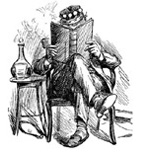
Charles Williams in Letters & Remembrances
LOVE DURING WARTIME
Charles Williams, a lifelong member of the Church of England, was an influential British theologian and an accomplished man of letters. He is best known as a principal member of the Inklings, an informal group that included J.R.R. Tolkien and Owen Barfield. The Inklings met regularly in C.S. Lewis’s rooms at Magdalen College in Oxford for nearly two decades beginning in the early 1930s to discuss literature, society, and culture among themselves and with various guests. Although Williams resided in London for most of his adult life, he was obliged to change his residence in 1939 when Oxford University Press, the firm for which he had worked as editor since being hired in 1908, moved to Oxford after Britain declared war on Germany.
Williams’s wife, Florence, however, chose to remain at their London flat. Williams rejoined her there on weekends when his schedule permitted, and Florence, whom he fondly called Michal, visited Oxford as often as she could manage. But for nearly six years they lived the better part of their time separated. Williams, who not only adored Michal but relied on her as chief inspirer and critic of his creative endeavors, deeply resented the arrangement and, upon settling into his quarters in Oxford, promptly initiated a daily exchange of letters that lasted until he took ill three days after the Germans surrendered to the Allies.
Williams’s part in this prolific exchange is accessible thanks to the dutiful research of Roma A. King Jr. King’s edition of Williams’s personal correspondence, published in 2002 under the title To Michal from Serge: Letters from Charles Williams to His Wife Florence, 1939-1945, includes representative selections, painstakingly transcribed by King, from nearly 700 hurriedly handwritten letters. In them we hear Williams at his best — as faithful Christian, loyal husband, caring father, and generous friend — and, occasionally, at his worst — as one who loved human beings but sometimes found them intolerable. What resounds above all else is the voice of a man “honestly struggling,” as King puts it in his introduction, “toward the light beyond the darkness.”
Contributing to the darkness was no end of practical concerns with which Williams dealt daily during this personal crucible. “Waking in the morning is not very cheery these days, is it?” he writes (May 20, 1940). “There emerges slowly in the mind a kind of consciousness…of the war, and of the need for being iron, so to speak, and of all the things depending on it, such as work and money.” There were bills to be paid and never enough money to pay them. As an editor, Williams received a meager income and waited impatiently for advances and royalties on his work as an author. In virtually every letter to Michal there is talk of receipts and expenditures, the latter always outstripping the former. There are numerous letters focused almost exclusively on the subject of sartorial dearth, the shortage of socks, for example, or the need for vests and knickers.
You May Also Enjoy
Our relationships with animals have gone wrong. What is tolerable in a few Mrs. Pumphreys is horrifying when it becomes common practice.
A certain scientific consequentialism claims that the “end” of medical experimentation (the advancement of science) justifies any “means.”
James Fenimore Cooper's 'The Last of the Mohicans' is the birthright of every American; it helps to explain who we are to ourselves.

